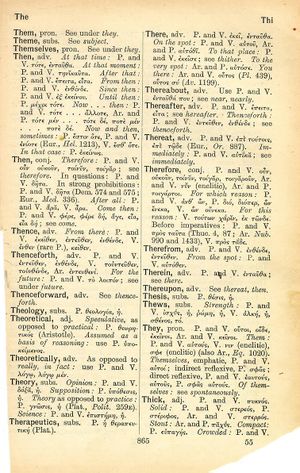therefore: Difference between revisions
From LSJ
Μισῶ πονηρόν, χρηστὸν ὅταν εἴπῃ λόγον → Cum recta fatur, improbum odi maxime → Den Schlechten hass' ich, wenn ein gutes Wort er spricht
(Woodhouse 5) |
(CSV5) |
||
| Line 1: | Line 1: | ||
{{ | {{Woodhouse1 | ||
| | |Text=[[File:woodhouse_865.jpg|thumb|link={{filepath:woodhouse_865.jpg}}]]'''conj.''' | ||
P. and V. οὖν, [[οὐκοῦν]], [[τοίνυν]], τοίγαρ, ταιγαροῦν, Ar. and V. νυν (enclitic), Ar. and P. τοιγάρτοι. | |||
<b class="b2">For which reason</b>: P. and V. ἀνθʼ ὧν, P. διό, [[διόπερ]], ὧν [[ἕνεκα]], V. ὧν [[οὕνεκα]]. | |||
<b class="b2">For this reason</b>: V. τούτων χάριν, ἐκ τῶνδε. | |||
<b class="b2">Before imperatives</b>: P. and V. πρὸς [[ταῦτα]] (Thuc. 4, 87; Ar. <b class="b2">Nub.</b> 990 and 1433), V. πρὸς τάδε. | |||
}} | }} | ||
Revision as of 10:06, 21 July 2017
English > Greek (Woodhouse)
conj.
P. and V. οὖν, οὐκοῦν, τοίνυν, τοίγαρ, ταιγαροῦν, Ar. and V. νυν (enclitic), Ar. and P. τοιγάρτοι.
For which reason: P. and V. ἀνθʼ ὧν, P. διό, διόπερ, ὧν ἕνεκα, V. ὧν οὕνεκα.
For this reason: V. τούτων χάριν, ἐκ τῶνδε.
Before imperatives: P. and V. πρὸς ταῦτα (Thuc. 4, 87; Ar. Nub. 990 and 1433), V. πρὸς τάδε.

